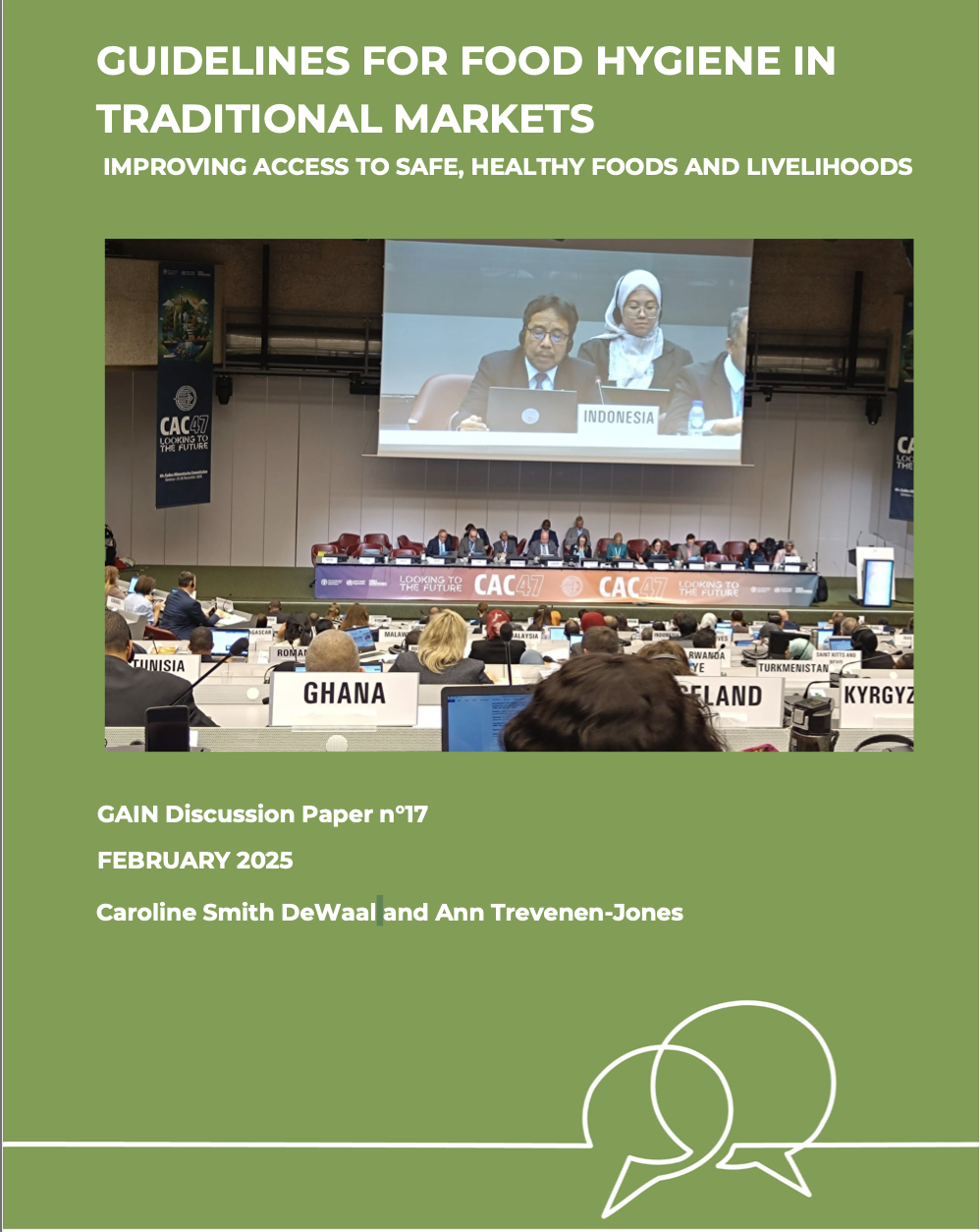Every year, unsafe food makes 600 million people sick and claims 420,000 lives – including 125,000 children under five (World Health Organization, 2015). These aren’t just numbers; they’re a call to action. At GAIN, we are using science and evidence to change this. For World Food Safety Day, we are spotlighting 10 ways we’ve advanced food safety over the past year.
1. GAIN helped drive global standards for safer traditional markets
Guidelines for Food hygeine in Traditional Markets
In November 2024, the CODEX Guidelines for Food Hygiene Control Measures in Traditional Markets for Food (CXG 103-2024) were officially adopted — a major milestone for food safety. Traditional markets are a daily food source for millions, especially in low- and middle-income countries. Improving hygiene in these spaces is critical to ensuring access to safe, nutritious, and affordable food. GAIN staff from multiple countries played a pivotal role in initiating and championing this process from start to finish (Centre International de Conférences Genève (CICG), 2024; DeWaal & Trevenen-Jones, 2025).
2.New Food Safety and Fortification Act passed in Kenya with GAIN’s support
In November 2024, Kenya enacted the County Food Safety and Fortification Act, marking a significant step forward for public health and nutrition. Since 2022, through the CASCADE project, GAIN has been actively engaging policymakers to address food safety and nutrition challenges. In meetings with legislators and policymakers from Nairobi and Nakuru counties, GAIN advocated for stronger investment in public health surveillance and better policy frameworks.
These efforts were recognized by stakeholders as instrumental in shaping the new Act and the accompanying County Food Safety Policy now under development.
3. New research from GAIN explores safe, sustainable use of food byproducts
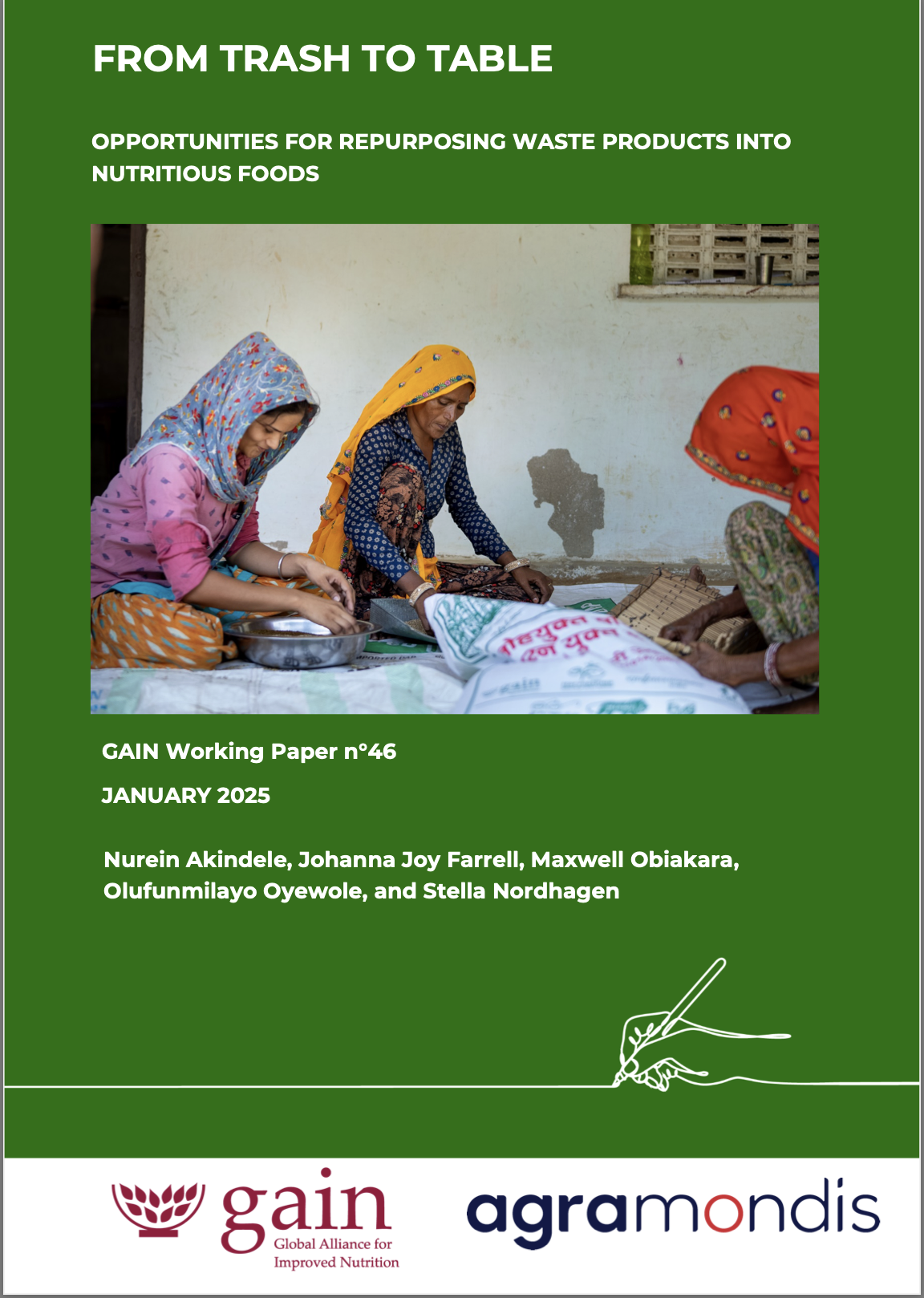
From trash to table- repurposing waste products into nutritious foods
In January 2025, GAIN published a Working Paper on how to safely reduce food waste by using nutritious byproducts. Developed in collaboration with a consultant, the paper reviews 21 food byproducts – including fruits, seeds, legumes, animal sources, and plants – and assesses their potential uses, nutritional value, food safety, feasibility of use, and consumer acceptability (Akindele et al., 2025).
By promoting safe, fit-for-purpose processing methods, this work aims to unlock the potential of byproducts to reduce waste and improve food system efficiency.
4. GAIN study highlights how rural vendors in Nigeria perceive and respond to food safety risk
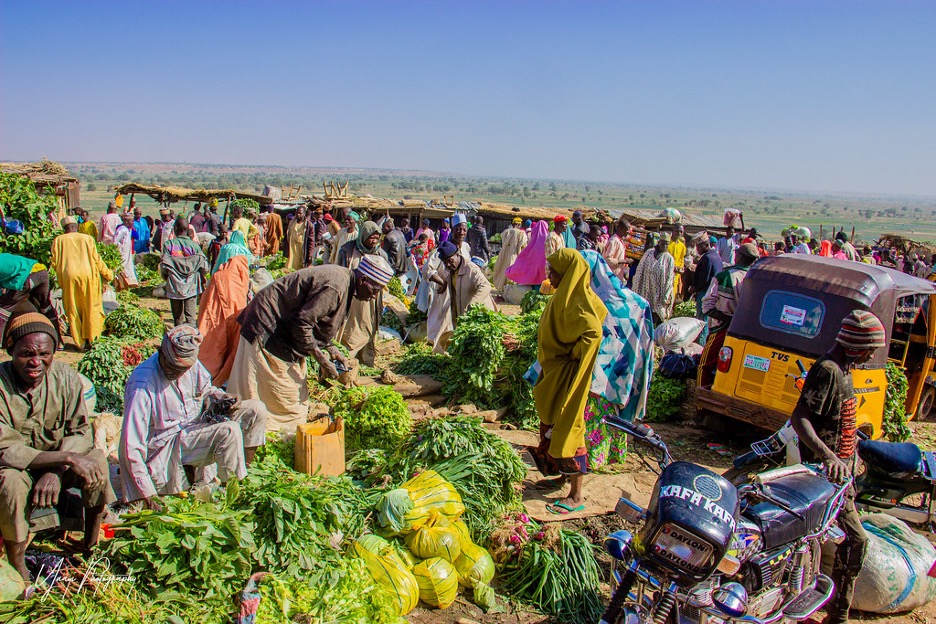
In February 2025, GAIN researchers published a study examining how rural market vendors in Nigeria understand and respond to food safety risks. Vendors in these settings often face significant challenges – from limited access to safe storage to broader social and economic constraints.
The study found a strong link between vendors’ risk perception and their food safety practices, suggesting that strengthening awareness could be a key driver of behavior change. This framework offers a valuable tool for designing interventions that improve food safety in informal markets (Wenndt et al., 2025).
5. New research from GAIN sheds light on food safety challenges in Ethiopian markets
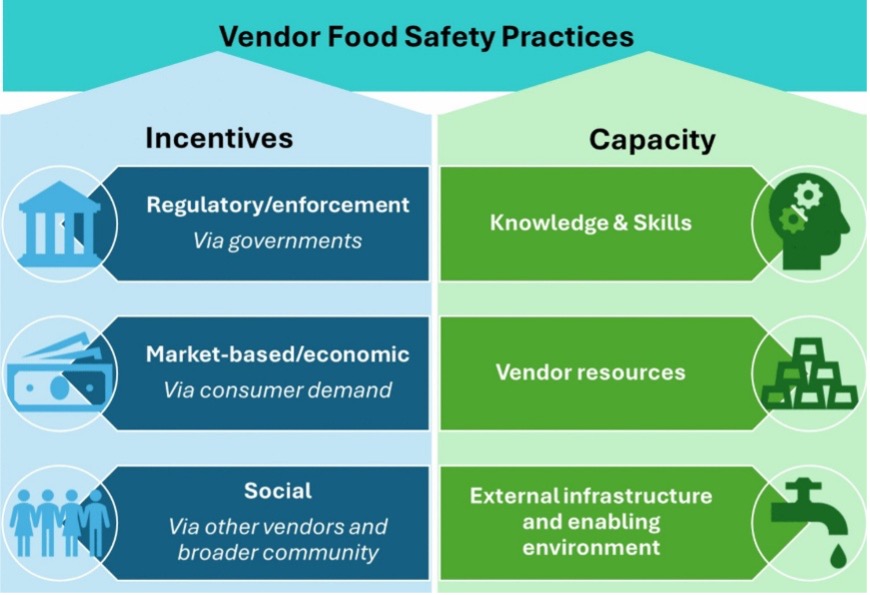
Traditional market vendors play a crucial role in food safety, especially in settings with limited regulation and oversight. In a March 2025 article, GAIN researchers applied the Henson et al. framework (Henson et al., 2023) to assess the incentives and capacity of Ethiopian vendors to practice food safety.
The study revealed that many vendors have limited knowledge of food safety, and it is often not seen as a top priority. These findings provide a foundation for designing more effective strategies to support vendors and strengthen food safety in traditional markets (Nordhagen et al., 2025).
6. GAIN helps elevate food safety in Tanzania’s draft National Nutrition Strategy

Between 2024 and 2025, GAIN staff led research and advocacy to ensure food safety was prioritized in Tanzania’s national nutrition agenda. Using a mixed-methods approach – including policy analysis, stakeholder consultations, and primary data collection – GAIN supported the finalization of the draft National Nutrition Implementation Strategy in April 2025.
Food safety was successfully included as one of the strategy’s top five components, backed by dedicated budget allocations. This marks a significant step toward integrating food safety into national nutrition planning.
7. GAIN and Punjab Food Authority launch strategic partnership for food safety in Pakistan

In April 2025, GAIN and the Punjab Food Authority formalized their collaboration with the signing of a Letter of Intent focused on improving food safety and child nutrition in Punjab, Pakistan. The partnership includes the development of a five-year roadmap for food safety and the creation of a dedicated food safety resource center at the Punjab Food Authority. This center will serve as a hub for scientific guidance and technical support – a key step toward strengthening local capacity and ensuring long-term sustainability in food safety efforts.
8. GAIN leads food safety gap analysis and training for the street food sector in Uganda
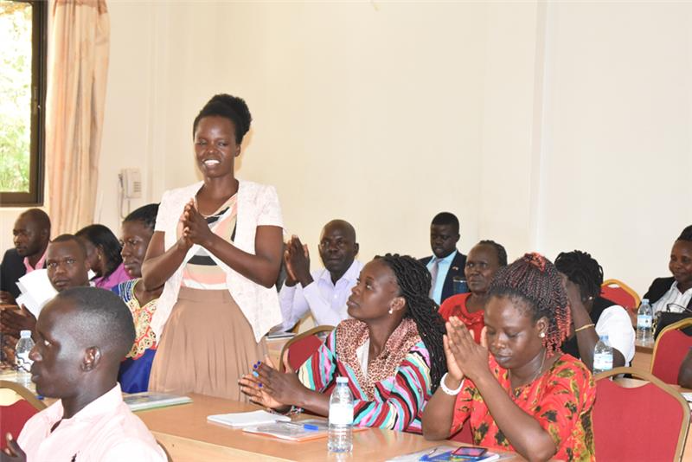
GAIN is working with Makerere University and the Kampala Capital City Authority (KCCA) to strengthen food safety among street food producers in Uganda. A recent gap analysis identified key strengths and areas for improvement across a variety of food products. In response, GAIN and its partners delivered a training on good manufacturing practices to private sector actors.
The next phase will focus on building government capacity, with plans underway for a training session tailored to KCCA staff. These efforts aim to deliver context-specific food safety guidance to both public and private sector stakeholders.
9. GAIN supports India’s Healthy Hygiene Street Food Hubs
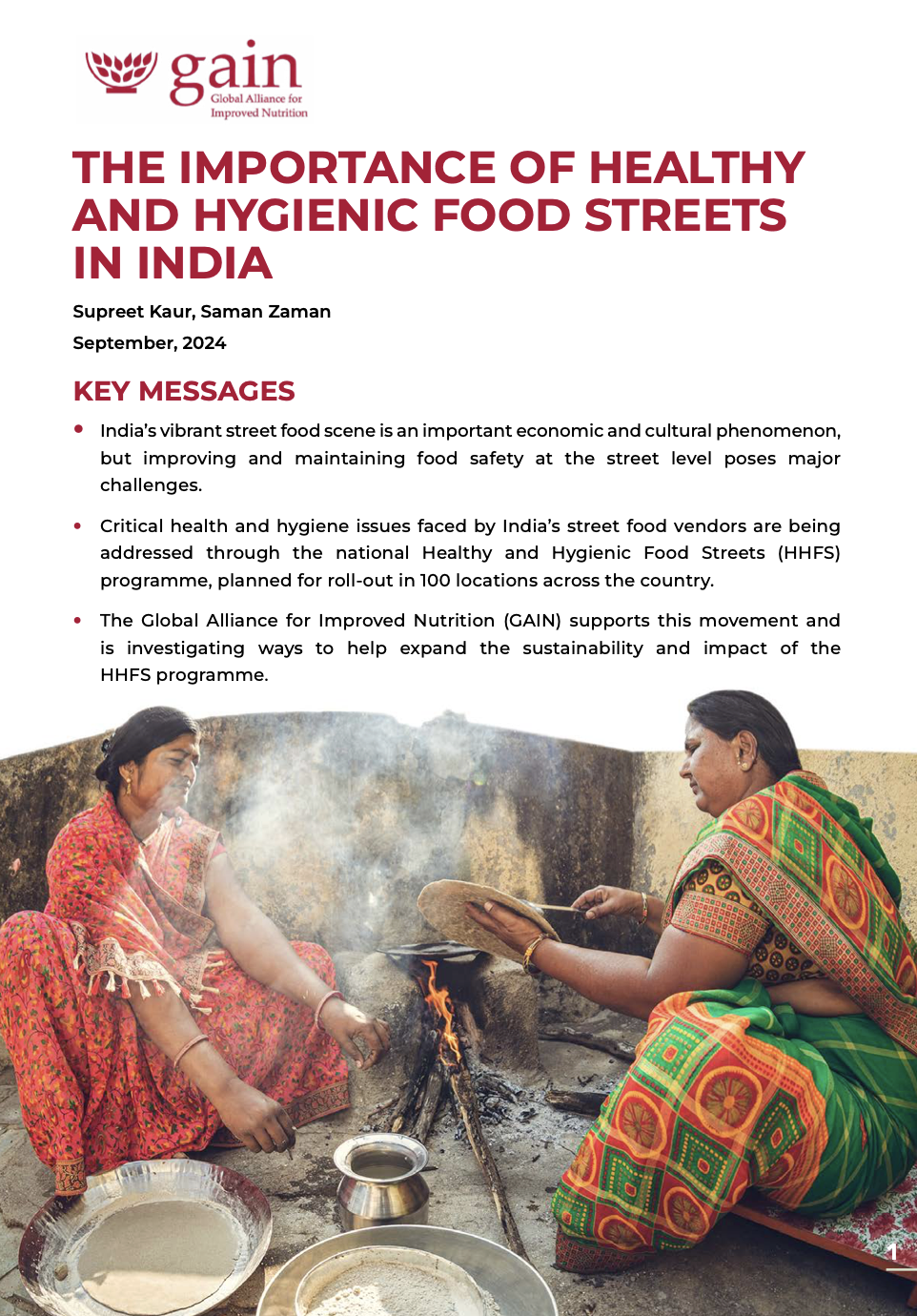
The Importance of healthy and hygeinic food streets in India
Launched in January 2024, India’s Healthy and Hygienic Food Streets Initiative promotes safe, nutritious street food by creating dedicated food hubs. Since its launch, the initiative has grown nationwide, with vendors sharing recipes that prioritize both taste and safety. GAIN is supporting this initiative through ongoing monitoring and evaluation, helping to track progress and identify best practices. A comprehensive report is being finalized to highlight lessons learned and opportunities for scaling impact.
10. GAIN supports development of Ethiopia-specific food safety guidelines for traditional markets
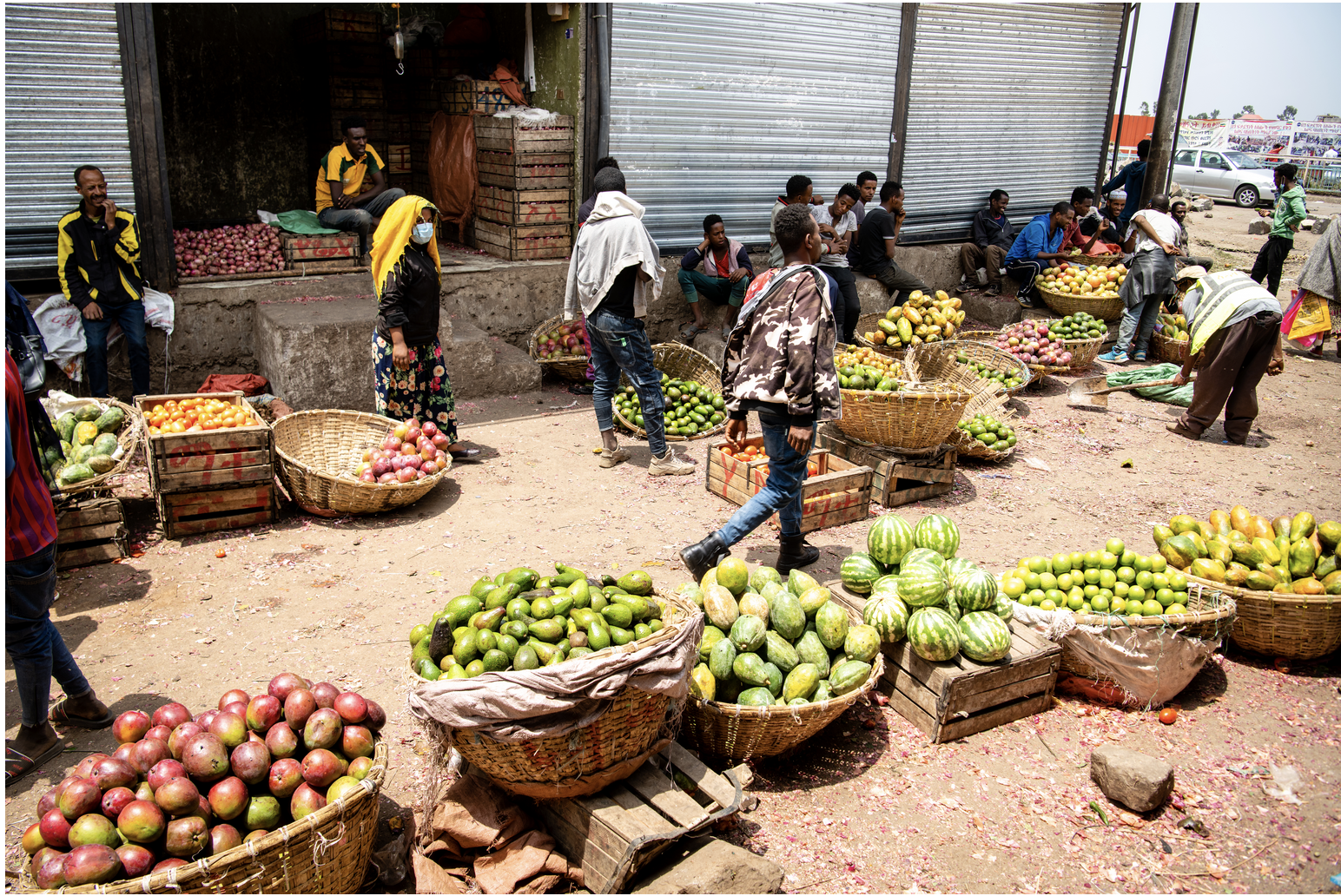
Over the past year, GAIN played a key role in developing Ethiopia’s Food Safety Guidelines for Traditional Markets, which have now been submitted for approval. In partnership with the Institute of Ethiopian Standards, GAIN staff visited markets across multiple regions to introduce the guidelines to local authorities and better understand site-specific challenges and opportunities. This hands-on engagement is helping ensure that the guidelines are not only technically sound, but also practical and responsive to the realities of Ethiopia’s diverse market environments.
These ten highlights reflect just a portion of how GAIN has worked over the past year to strengthen food safety using evidence-based approaches. Across our programs, we apply the best available evidence to real-world contexts – from advocating for policy change grounded in local realities to promoting proven, culturally appropriate practices in traditional markets. Our commitment to ensuring safe, nutritious, and sufficient food for all continues, with a focus on reaching the most vulnerable.
Happy World Food Safety Day!
References
Akindele, N., Farrell, J., Obiakara, M., & Nordhagen, S. (2025). From Trash to Table: Opportunities for repurposing waste products into nutritious foods (Working Paper 46). Global Alliance for Improved Nutrition (GAIN). https://doi.org/10.36072/wp.46
Centre International de Conférences Genève (CICG). (2024, November 25). Forty-seventh session of the FAO/WHO Codex Alimentarius Commission adopts new standards. World Health Organization.
DeWaal, C., & Trevenen-Jones, A. (2025). Guidelines for food hygiene in traditional markets: Improving access to safe, healthy foods and livelihoods (17; Discussion Paper). Global Alliance for Improved Nutrition (GAIN). https://doi.org/10.36072/dp.17
Henson, S., Jaffee, S., & Wang, S. (2023). New Directions: For tackling food safety risks in the informal sector of developing countries. International Livestock Research Institute. https://cgspace.cgiar.org/bitstream/handle/10568/130652/food_saftey.pdf?sequence=2&isAllowed=y
Nordhagen, S., Hagos, S., Gebremedhin, G., & Lee, J. (2025). Vendor capacity and incentives to supply safer food: A perspective from urban Ethiopia. Food Security. https://doi.org/10.1007/s12571-025-01526-8
Wenndt, A., Nordhagen, S., Okoruwa, A., Onuigbo-Chatta, N., Swartz, H., Andohol, P., Igho, S., & Lambertini, E. (2025). Food safety through the eyes of rural market vendors in northwest Nigeria. Journal of Rural Studies, 114, 103527. https://doi.org/10.1016/j.jrurstud.2024.103527
World Health Organization (Ed.). (2015). WHO estimates of the global burden of foodborne diseases. World Health Organization.
